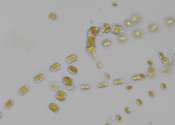Researchers bring 60-year-old dormant algae cells to life
New research at Åbo Akademi University, Finland, has managed to circumvent previous challenges in finding out how microalgae adapt to global warming by studying up to 60-year-old microalgae cells from the Archipelago Sea. ...









